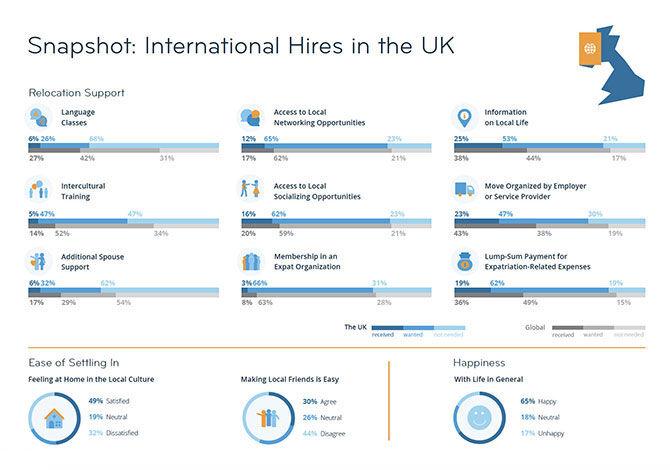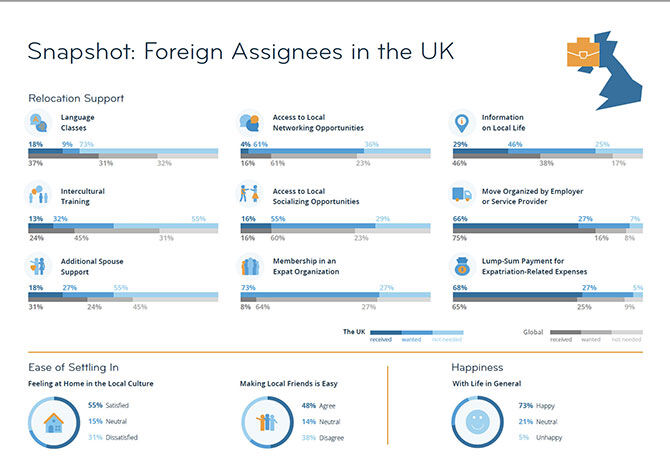Overseas assignees 'getting raw deal' in the UK
Global employees working in the UK do poorly in terms of support from their employers compared to expatriates working elsewhere in the world, according to a new survey.

 26 March 2019
26 March 2019
International hires working in the UK badly served by their companies
The report, which looks at nine different types of relocation support that global employees and their partners receive from companies, found that international hires working in the UK were particularly badly served by their companies compared to their contemporaries elsewhere in the world.And while foreign assignees sent by their companies to work in Britain were found to receive some benefits, specifically as far as moving and financial compensation was concerned, their overall employer support was still low compared to other countries.The report looks at the situation of expats working in China, France, Germany, Hong Kong, the Netherlands, Switzerland, the UAE, and the US, in addition to the UK.More from InterNations:
Brexit: Can expat communities contribute to a positive employee experience?UK support for foreign assignees needs to improve if companies want to stay competitive
“When it comes to benefits for international hires around the world, international recruiting can often learn from global mobility management. In the UK, however, the support for foreign assignees is also below average,” said Theresa Häfner, head of business solutions at InterNations.“Companies in the UK are in need of skilled professionals from abroad but in order to stay competitive in the war for talent, they have to support them more."Moving abroad comes with organisational as well as emotional challenges. Especially with the current situation in the UK, employers need to understand the relevance of both practical and personal support for their employees, if the country wants to stay an attractive destination for global talent.”Among the survey's findings:- Only two-thirds of foreign assignees in the UK had their move organised by their employer, which was much lower than the global average of 75 per cent and was the second lowest among the nine countries featured. Only foreign assignees in Hong Kong (63%) received less support.
- Only 19 per cent of UK international hires were offered a lump-sum payment, much lower than the global average of 36 per cent. Similarly, only 23 per cent received help in organising their move, compared to 43 per cent globally. Again, only in Hong Kong did international hires get less support (15%).
- Foreign assignees in the UK came at the bottom of the list in such areas as receiving information on local life (29% v 46% globally), spousal support (18% v 31%) and intercultural training (13% v 24%).
- Only four per cent of foreign assignees in Britain and 12 per cent of international hires were offered access to local networking, compared to 16 and 17 per cent respectively globally. "The support is even more bleak when it comes to membership in an expat organisation," said InterNations. "This is the type of relocation support that the smallest share of both expat types received but most of them would have liked: just three per cent of international hires were offered this type of personal support, but 66 per cent would have liked it."
Getting used to British culture
However, the report added: "Despite the extremely rare personal support for global employees in the UK, they don’t seem to struggle too much with settling down in the country: 49 per cent of international hires state they feel at home in the local culture and 55 per cent of foreign assignees say the same."In general, foreign assignees in the UK seem to settle in better than international hires, which might be due to the fact that they at least receive more practical support from their employers."In fact, 63 per cent of foreign assignees find it easy to get used to the British culture, which is five percentage points higher than the global average and the second highest share among the nine countries featured."* The findings in the report are based on the annual Expat Insider survey conducted by InterNations. Last year, 18,135 expats from across the globe took part in the survey.
About InterNations Business Solutions
InterNations Business Solutions is a trusted partner for global mobility and HR professionals. As InterNations is the world’s largest expat network with 3.4 million members in 420 cities, we provide expert insights and tailored solutions for smooth and successful foreign assignments and improved retention of international hires. With the InterNations network, employees and their families are empowered by peer-to-peer support. This helps them through the most critical onboarding phase and seamlessly integrates them into their new home country for the entire time abroad. In turn, they are more productive at work and save global mobility and HR professionals time and costs.Subscribe to Relocate Extra, our monthly newsletter, to get all the latest international assignments and global mobility news.Relocate’s new Global Mobility Toolkit provides free information, practical advice and support for HR, global mobility managers and global teams operating overseas. Access hundreds of global services and suppliers in our Online Directory
Access hundreds of global services and suppliers in our Online Directory©2026 Re:locate magazine, published by Profile Locations, Spray Hill, Hastings Road, Lamberhurst, Kent TN3 8JB. All rights reserved. This publication (or any part thereof) may not be reproduced in any form without the prior written permission of Profile Locations. Profile Locations accepts no liability for the accuracy of the contents or any opinions expressed herein.























